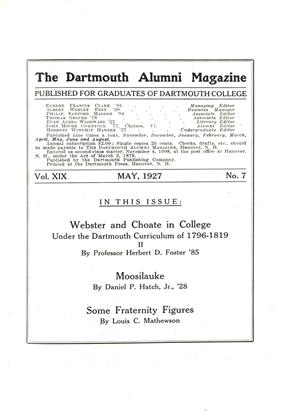(From The Pennsylvania Gazette)
The reputation of President Hopkins, of Dartmouth, for conservative thought is such that any proposal he makes for the betterment of intercollegiate athletics deserves the most thoughtful consideration. However, the remedy he proposes for reducing the excessive attention that is now given to football will appeal to most persons connected with athletic administration as more likely to ruin the game than to help it. What seems to appal Dr. Hopkins and others who are continually suggesting some new panacea is that football overshadows all other forms of college sport and tends to distract the attention of undergraduates from the main purposes of a college education. He proposes as a remedy that each college be represented by a home and a visiting team, that membership on teams be limited to sophomores and juniors and that undergraduate coaches be substituted for the professionals. The two-team suggestion was made last fall by President Little, of Michigan, the idea of student coaches has been advanced many times, but the proposal to limit membership on football teams to two classes is novel.
Granted that football does occupy entirely too much of students' time and thought, is not the fault chargeable to the American character rather than to football itself? If it is desired to reduce outside interest in the game, why not do as Dr. Eliot, of Harvard, once suggested and limit attendance to the student body? It might also help. if all newspaper reporters were barred. But why should the game be strangled in this way because students, alumni and the Public find it peculiarly exciting? It should be remembered that Americans take all their sports seriously, just as they do their business. In athletics as in business they believe that anything worth doing at all is worth doing well, but this spirit does not prevent a keen enjoyment of competition, nor does it necessarily exert a bad influence upon athletics.
There is, of course, a great deal of unrest among college authorities on the subject of athletics, for while they have controlled it pretty well, they don't know precisely where it is leading. For this reason, without attempting to pass judgment upon Dr. Hopkins' ideas, a general conference such as he suggests will render valuable service, if only to confirm the administrators of college athletics that they are on the right track.
 View Full Issue
View Full Issue
More From This Issue
-
 Article
ArticleWEBSTER AND CHOATE IN COLLEGE
May 1927 By Herbert Darling Foster '85 -
 Article
ArticleTHE UNDERGRADUATE CHAIR
May 1927 -
 Article
ArticleMOOSILAUKE
May 1927 By Daniel P. Hatch, Jr. '28 -
 Article
ArticleSOME FRATERNITY FIGURES
May 1927 By Louis C. Mathewson -
 Article
ArticleDARTMOUTH STUDENTS SAID TO BE IRRELIGIOUS
May 1927 -
 Class Notes
Class NotesClass of 1921
May 1927 By Herrick Brown







